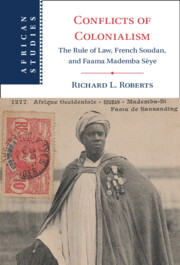3 results
6 - Rule of Law and the Bargains of Collaboration
-
- Book:
- Conflicts of Colonialism
- Published online:
- 17 February 2022
- Print publication:
- 24 February 2022, pp 178-229
-
- Chapter
- Export citation
5 - The Coming Storm, 1898–1899
-
- Book:
- Conflicts of Colonialism
- Published online:
- 17 February 2022
- Print publication:
- 24 February 2022, pp 153-177
-
- Chapter
- Export citation

Conflicts of Colonialism
- The Rule of Law, French Soudan, and Faama Mademba Sèye
-
- Published online:
- 17 February 2022
- Print publication:
- 24 February 2022

